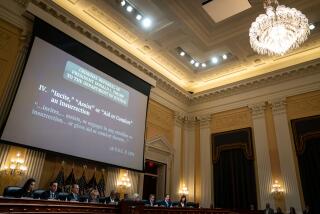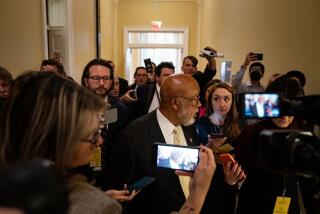Martha Stewart’s Phone Used in Call to Waksal
- Share via
A congressional committee examining Martha Stewart’s sale of ImClone Systems Inc. stock has found a possible new discrepancy in her account to investigators, a panel spokesman said Thursday.
Stewart has said she and former ImClone Chief Executive Samuel D. Waksal did not speak between Dec. 14 and Jan. 5. But records from a rented mobile phone used by Stewart and an employee show a five-minute call to Waksal’s personal mobile phone on Dec. 31, said Ken Johnson, spokesman for the House Energy and Commerce Committee.
The employee of Martha Stewart Living Omnimedia Inc., who was traveling with Stewart in Mexico at the time, told investigators that she did not make the call to Waksal, Johnson said.
“We believe someone has lied to the committee and possibly has conspired to obstruct a congressional investigation,” Johnson said. “Her [Stewart’s] story has evolved over time; there has been a long list of inconsistencies.”
The panel is investigating Stewart’s sale of nearly 4,000 ImClone shares Dec. 27, the day before the company disclosed that its cancer drug Erbitux had been rejected by the Food and Drug Administration.
The committee, chaired by Rep. W.J. “Billy” Tauzin (R-La.), will announce as early as Tuesday what, if any, action it will take against Stewart, Johnson said.
Those options include subpoenaing her to testify before Congress, referring findings to the Justice Department for review and recommending criminal charges against Stewart.
A Stewart spokeswoman could not be reached for comment.
Waksal, who has been charged with securities and bank fraud, perjury and obstruction of justice, is accused of trying to sell ImClone stock Dec. 27--and advising family members to do likewise--after learning that the FDA was planning to announce its rejection of Erbitux.
Stewart has said she sold her ImClone holdings Dec. 27 because of a prearranged agreement with her Merrill Lynch broker to sell if the stock dipped below $60, as it did that day.
But congressional investigators point to that statement as an example of what they have called a pattern of changing her story.
Originally, Stewart’s lawyers told investigators that the so-called stop-loss order had been in place since late October.
But investigators responded that the stock dipped below $60 twice in November and no sale was triggered.
Stewart’s legal team then said they had been mistaken, that the stop-loss order was entered in late November, Johnson said.
Johnson declined to say what action the committee would take in the matter, saying it still had some work to do before an announcement could be made.
“We have given Ms. Stewart every opportunity to meet voluntarily with our investigators and she has refused all of our overtures,” Johnson said. “As a result, that leaves us with few options.”






